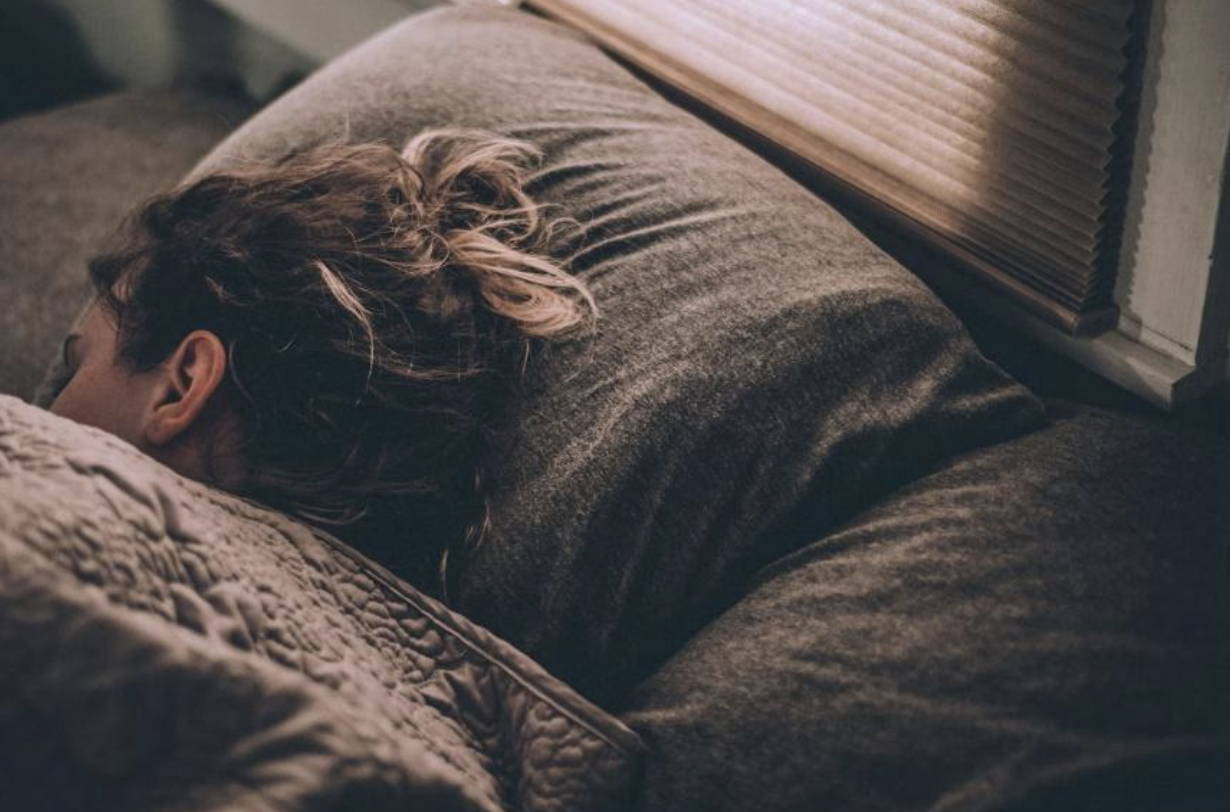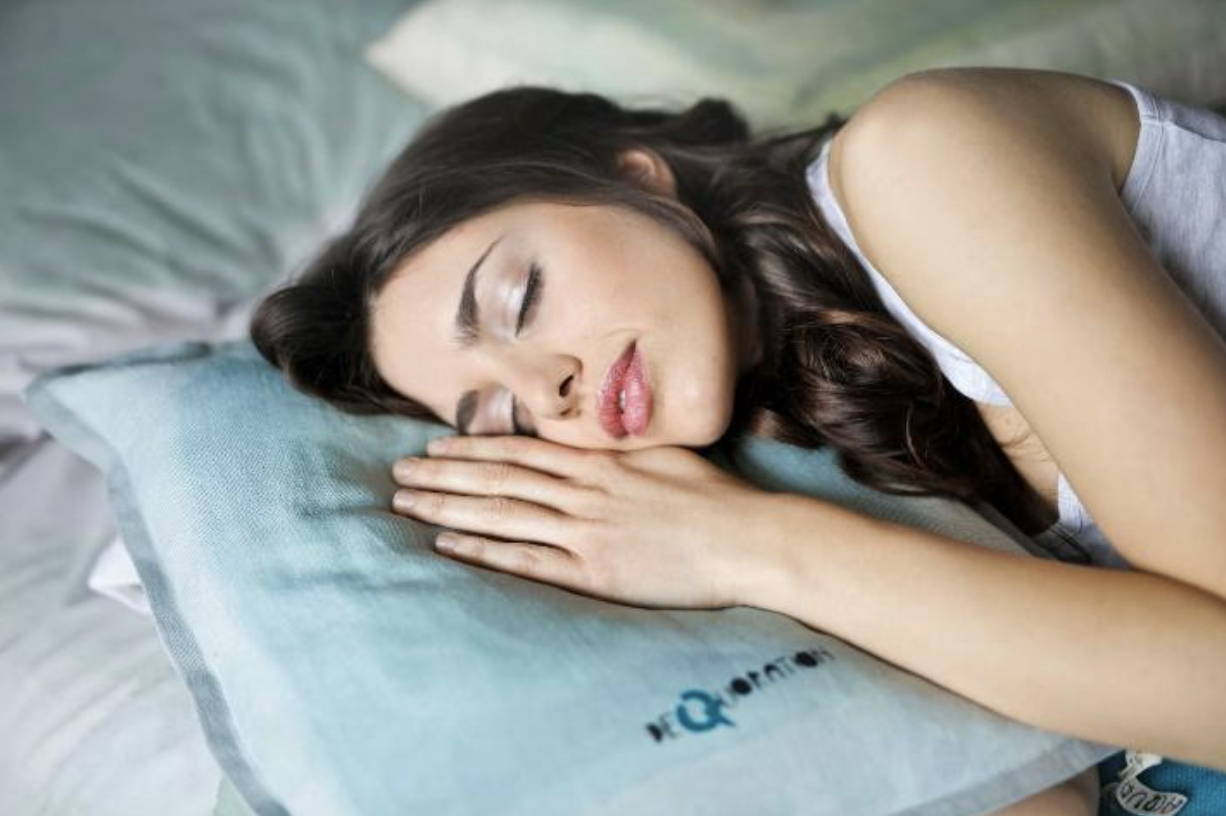If you're struggling to get deep sleep, this guide has tips from avoiding caffeine before bed to creating the perfect sleeping environment.

December 2022. This article is independently written by Shelby Golding. All opinions given are hers. Shelby has been certified as a personal trainer and nutritional specialist since 2007. In 2008, she found her passion for writing about these topics and hasn't looked back.

Why Do People Struggle With Sleep?
There are many reasons why people struggle with sleep, ranging from poor sleep habits we’ve learned since childhood to unavoidable stress Here are some common causes:
- Age
- Excess stimulation before bed (e.g., using your phone, watching TV, or doing rigorous exercise)
- Noise disturbances
- Too much light in the bedroom
- Napping during the day
- Chronic pain
- Not getting enough sunlight
- Certain prescription medications
- Stress
- Anxiety
- Depression
- Caffeine, smoking, and alcohol
For some, it can take time to identify what’s causing your sleep problems, and for others, you’ll know right away. But taking time to identify the issues and address them can help you get deeper sleep and feel more rested when you wake each morning.
How Does Anxiety Affect Sleep?
Anxiety can have a significant impact on sleep. For example, if you experience excessive worrying or overthinking, it can be difficult for your mind to relax and let you fall asleep. If you do manage to drift off, you may wake up throughout the night or too early in the morning or even have stressful dreams that rob you of sleep.
How Does Stress Affect Sleep?

Stress is another factor that may impact your sleep. Constant feelings of being overwhelmed or like you're under pressure can increase the stress hormone cortisol in your body, making it difficult for your mind and body to fall asleep. And when you do sleep, it may be fleeting or frequently interrupted, leaving you more stressed in the morning.
What Exactly Is Insomnia?
Insomnia is a common sleep disorder that causes difficulty falling asleep or staying asleep. People with insomnia may experience sleepless nights, resulting in further issues, such as brain fog, confusion, or sensations similar to being drunk.
There are several reasons why some experience insomnia, including excessive stress, anxiety, medications, and underlying medical conditions.
There are several reasons why some experience insomnia, including excessive stress, anxiety, medications, and underlying medical conditions.
Habits That May Affect Sleep
Some habits can make it difficult to fall asleep or get restful sleep. Here are the most common culprits:
- Caffeine: Caffeine is a potent stimulant that can make it difficult to fall or stay asleep. And it’s not just found in coffee – caffeine is found in chocolate, cocoa powder, green tea, white tea, soda, and some supplements.
- Alcohol: Although alcohol may make you feel drowsy, it can disrupt your sleep and cause you to wake up throughout the night or leave you tired in the morning.
- Smoking: The nicotine in cigarettes can also affect your sleep and increase your risk of insomnia.
Watching TV Before Bed
Some people find that watching TV helps them relax and fall asleep while others feel more awake and mentally engaged after tuning in. Regardless, late-night exposure to a screen can disrupt melatonin production and increase sleep disturbances. And if you sleep with the TV on, you’re more likely to wake up through the night or feel mentally foggy the next day.
How Much Sleep Do You Really Need?
The National Sleep Foundation recommends that adults between the ages of 18-64 get 7-9 hours of sleep per night. However, they also note that some people may need more or less sleep depending on their age, lifestyle, and health.
Try starting at eight hours each night and pat attention to how rested you feel. If you still feel tired and groggy, experiment with 9 hours of sleep. And if you feel overslept, try 7.5 hours instead.
Try starting at eight hours each night and pat attention to how rested you feel. If you still feel tired and groggy, experiment with 9 hours of sleep. And if you feel overslept, try 7.5 hours instead.
Why Is Sleep So Important?
Sleep is important because it restores the body and mind and helps improve focus and concentration. Your body goes into self-repair mode when it's sleeping, nourishing your muscles and your brain, and assisting in digestion. Getting enough sleep can also help reduce stress and anxiety levels.
According to recent research, restful sleep might also allow your brain to flush toxins using cerebrospinal fluid. And for a complete flush, you want to aim for a full night of restful sleep so your body can cycle through deep and REM stages naturally.
According to recent research, restful sleep might also allow your brain to flush toxins using cerebrospinal fluid. And for a complete flush, you want to aim for a full night of restful sleep so your body can cycle through deep and REM stages naturally.
What Happens If You Don't Get Enough Sleep?
If you don’t get enough sleep, you may feel tired during the day, have trouble concentrating and focusing on tasks, or experience increased irritability and moodiness. Over time, chronic sleep deprivation can also lead to serious health problems like obesity, heart disease, and diabetes.
Tips for Deeper Sleep
You can do a few things to help yourself get a deep, restful night of sleep. Try out a few of these tips and see what works best for you:
Stick to a Sleep Schedule
Establish a regular sleep schedule and stick to it as much as possible. This means going to bed and waking up at the same time each day, even on weekends or if you don't feel tired. Ideally, this schedule should allow you to spend at least 8 hours in bed.
Remove Potential Causes of Sleep Disruption
Make sure your bedroom is cool, dark, and quiet. Consider investing in blackout curtains or an eye mask if there’s light in the room, as this can disrupt your sleep. And if noise is keeping you up at night, try using a white noise machine or earplugs.
The temperature of your bedroom also matters – around 65 degrees Fahrenheit is ideal for most people.
The temperature of your bedroom also matters – around 65 degrees Fahrenheit is ideal for most people.
Avoid Caffeine and Alcohol
Avoiding caffeine and alcohol before bedtime can help, as both substances can interfere with your ability to fall asleep, stay asleep, or feel rested when you wake up. Try to keep caffeine consumption limited to the mornings if possible and reduce your alcohol intake as much as possible.
Exercise
Get some exercise during the day! Exercise can help improve your sleep quality by reducing stress and promoting relaxation. Just be sure to exercise at a reasonable time, as exercising right before you sleep can make it difficult for your body and mind to feel relaxed before bed.
Find Your Calm
Practice relaxation techniques like deep breathing exercises, meditation, or yoga before bed. In addition, playing calming music, reading, or working on a relaxing hobby may help you fall asleep.
Decrease Screen Time
Avoid working or using electronic devices in bed, as the blue light from these devices can interfere with your body's natural sleep cycle. If you need to use a computer or phone before bed, try dimmed settings or an app that filters out blue light.
Get Comfy
Make sure your bed and bedroom are comfortable. This means having a supportive mattress and pillows that are comfortable for you, and a bedroom environment that helps you feel calm and relaxed. If you're uncomfortable, you're more likely to toss and turn all night.
What to Try Next
If you're still struggling with insomnia or sleep disturbances, it may be time to talk to your doctor to identify the issue. Once diagnosed, your healthcare provider may recommend treatment options that can help you get the sleep you need.
Get Ready for a Great Night's Sleep
Getting enough deep sleep is essential for good health and well-being, and if you’re not sleeping well, try out these tips to see what works best for you. Remember, contact your healthcare provider if you believe your sleep issues may be related to an underlying medical condition.
And if chronic pain is making it difficult to sleep, try the Kailo Pain Patch to see if it can help you fall asleep and stay asleep through the night. A recent clinical study showed a significant improvement in sleep pain and an increase in sleep quality with Kailo.
Disclaimer: Kailo should not be used if you have a pacemaker or if you are pregnant. Always consult your doctor or health care professional before using Kailo.
And if chronic pain is making it difficult to sleep, try the Kailo Pain Patch to see if it can help you fall asleep and stay asleep through the night. A recent clinical study showed a significant improvement in sleep pain and an increase in sleep quality with Kailo.
Disclaimer: Kailo should not be used if you have a pacemaker or if you are pregnant. Always consult your doctor or health care professional before using Kailo.






